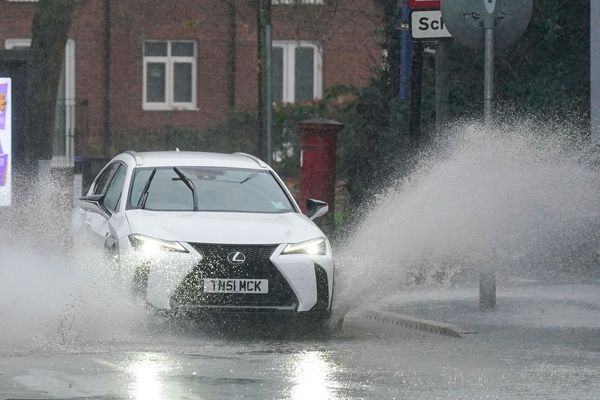
After the idea of a Formula 1 wildcard system was floated by teams and series bosses, it is a prospect that has sparked debate.
From providing rookies with a golden chance to impress, to adding an extra competition dimension to F1, the pitch was put forward for evaluation at an F1 Commission meeting in London earlier this week.
Here, our writers give their take on the idea and what could happen.
A fantastic idea to let talent flourish but practicalities get in the way – Jon Noble
The buzz around Andrea Kimi Antonelli this year, and Oliver Bearman’s impressive debut at the Saudi Arabian Grand Prix, shows there is a great deal of interest in the next generation coming through.
But F1 teams have always found themselves a bit conflicted about how best to get rookies race ready – which is why in theory a wildcard system would be fantastic.
With the grid so competitive now, and the fight for constructors’ championship positions so intense, the reluctance to risk everything by committing for a whole season to a rookie who will make mistakes is pretty obvious.
Points mean prizes in F1, and there is no better way to bring them home than have an experienced hand on tap.

While that is obvious for the present, it bottles up problems for the future in making it difficult to bring the next generation of talent through.
There is an element of bravery to a frontrunning team taking on a rookie, but McLaren has shown with Oscar Piastri that it can be done well.
But that approach at the front is the exception rather than the rule, and often only comes after a bunch of testing in old cars (just as Mercedes is doing with Antonelli).
The huge fan interest that Bearman’s debut triggered in Saudi showed the value to be had in one-off outings – and just imagine that repeated at more races around the world.
Sadly, practicalities get in the way. F1’s cost cap and equipment/personnel restrictions (plus garage space) means a third car cannot run, and it would be lunacy to impose a rule that says a team must replace one of its regulars with a rookie at a certain number of races per year.
F1 has a precedent for third cars - James Newbold
Imagine the crossover stories. As Red Bull's simulator driver, it was logical that Jake Dennis should be given a Friday practice run out in Abu Dhabi last year. If the outgoing Formula E champion was given a chance at a race weekend outing, along with any of the sim jockeys yet to be handed an F1 start such as Aston Martin's Nick Yelloly (a winner of the Spa 24 Hours in sportscar racing) or the likes of IndyCar race winner Pato O'Ward at McLaren as part of the mooted wildcard scheme, it could provide a point of intrigue and do wonders for raising the profile of the wider motorsport world.
But a good thing for fans doesn't necessarily make for a good deal for teams and the practicalities involved in realising such a scheme would be enormous. So, if F1 wants to go further than its current requirement for teams to make their cars available in two practice sessions per year to a rookie, then baby steps would be the way to go. And F1 has already trialled something similar before.

Back in the mid-2000s, teams that finished fifth or lower in the constructors' standings were eligible to run third cars in practice. For teams that were struggling for money, it was a useful income source - witness Midland using five different drivers in the role in 2006, or Minardi using Formula 3000 backmarker Chanoch Nissany in Hungary 2005.
But for the bigger outfits it could give highly-rated young guns a proper grounding in race weekends. BMW-Sauber in 2006 blooded Robert Kubica, whose Friday performances were good enough to warrant replacing Jacques Villeneuve, and it subsequently tried out a Formula Renault 3.5 racer by the name of Sebastian Vettel...
Wildcards are a non-starter, but the underlying idea to help rookies has merit – Filip Cleeren
As fans, we are always daydreaming about what certain highly-rated youngsters or overlooked drivers could do in an F1 car. Friday practice or testing two-year old machinery is one thing, but completing a proper grand prix weekend is a whole different ballgame and by far the best way to find out if rookies have the steel and ability to compete.
Bearman's cameo for Ferrari in Saudi Arabia has further shown that it doesn't have to be costly to put your faith in a rookie.
Thankfully Bearman has landed a grand prix seat with Haas in 2025, but there are plenty of deserving youngsters - and even various established F2 champions who have had to build a career elsewhere - who never get a chance to land a seat on F1's limited 20-car grid.
It is therefore only normal that the topic of third cars or wildcard drivers comes up once in a while, and it is quite surprising that the conversation even made it into the F1 Commission this time.
But as stated, the reality of F1's cost cap is prohibitive of teams fielding third cars. Even if teams agreed to make an exemption for third cars, that would still be a huge burden on lower-end teams who aren't set up to provide one.

Forcing teams to replace one of their regular drivers with a wildcard driver is completely impractical too. First of all, fans flock to races to see their favourite drivers, and sponsors also want to see the big names they pay for compete. Imagine if tens of thousands of Dutch fans pay hard-earned money to book a summer vacation and drive their camper vans to Hungary, only to find out that Verstappen will sit out the weekend for a junior driver? Right.
It would also open the door to F1 teams gaming the system, as they always do, by timing rookie runs with taking engine penalties or other strategical chicanery.
Again, daydreaming is fun, but this idea is probably exactly just that.
What I do applaud is the underlying thought behind it, namely handing out more opportunities for rookies to make grand prix weekend mileage. Currently teams have to replace one of their regular drivers by a rookie for two Friday practice sessions per season. It would not be such a bad idea to expand it to four or even six runs across a 24-race calendar, as sprint weekends have shown that reduced practice time doesn't hurt experienced drivers all that much as they prepare their race weekends.
The rules around testing of a previous car mean that rookies are set to test irrelevant cars again by the time the all-new 2026 regulations come around, so any cost-efficient way to give them mileage in current machinery is welcome.







